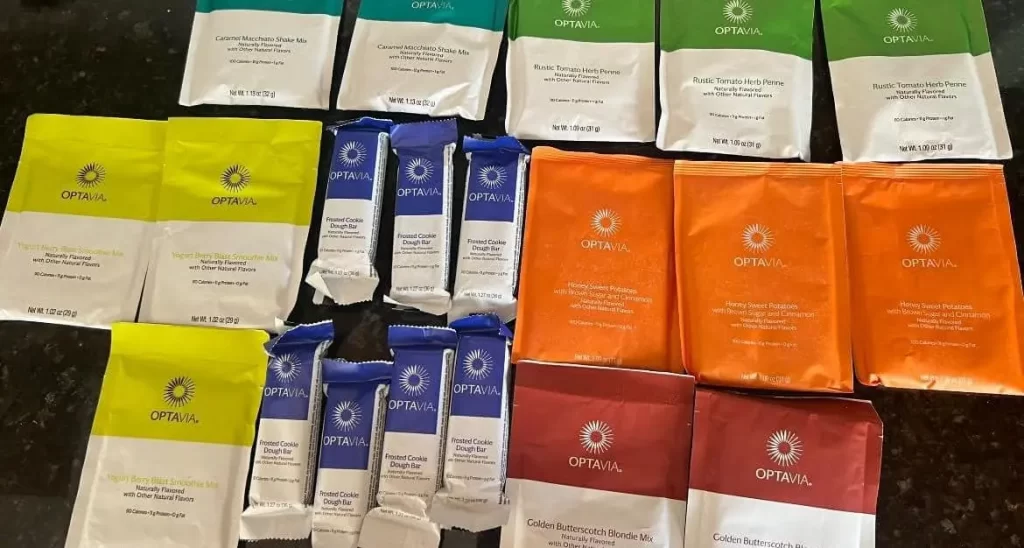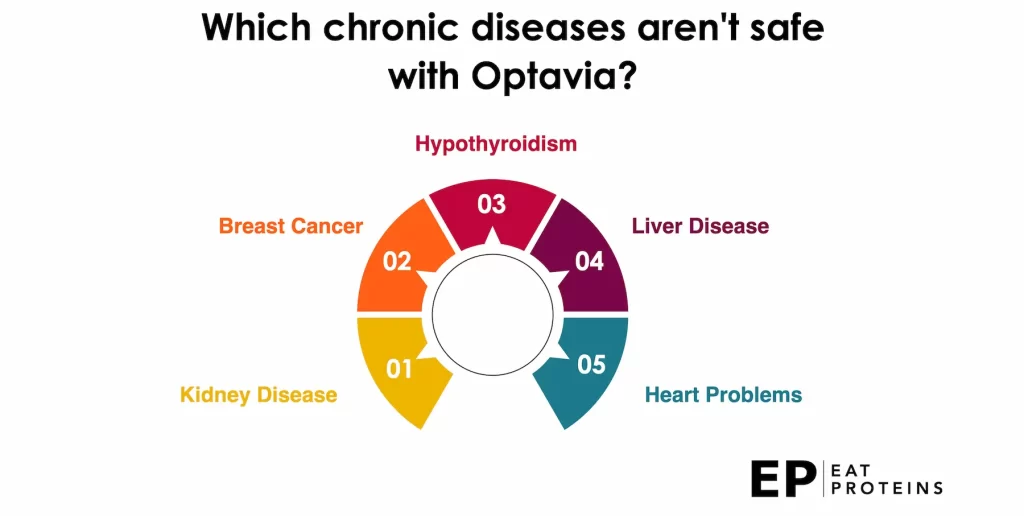
The Optavia diet is generally safe for you and even has positive benefits for healthy individuals. The study titled “Randomized controlled trial assessing two commercial weight loss programs in adults with overweight or obesity” conducted by Linda M. Arterburn, Ph.D. in 2019 found that participants in the Optavia group did not experience any serious adverse events related to the intervention.
The results of the study showed that participants following the Optavia plan experienced weight loss and improvements in body composition.
The Optavia diet has downsides for those with certain medical conditions that should be considered. It can lead to kidney problems for those with a history of kidney disease. It can exacerbate gastrointestinal symptoms for those with gastrointestinal disorders, such as irritable bowel syndrome (IBS) or inflammatory bowel disease (IBD).
It can lead to constipation by decreasing bowel movement frequency. The Optavia 5 and 1 plan may not provide sufficient calories, macronutrients, and micronutrients required for a healthy pregnancy.
Despite the potential side effects of the Optavia diet, factors such as convenience, social values, and personal preference play a big part.
Dr. Manny Noakes who serves as a non executive Director for Meat and Livestock Australia said “Convenience simplifies the process and eliminates common barriers to adherence.” According to Alan S. Levy, Ph.D., a senior scientist at FDA, a significant number of U.S. adults (15% of women and 13% of men) use meal replacements as their weight-loss strategy becasue of the convenience.
What are the health risks and disadvantages of the Optavia diet?
The risks and disadvantages of the Optavia diet include feeling sick, hunger, constipation and infrequent bowel movements, nausea and discomfort in the stomach, muscle loss, cardiovascular functional decline, and weight regain.
These are generally rare effects, though feeling sick and constipation are more common for those with related pre-existing conditions.
The present research provides evidence of the potential risks associated with low-calorie diets, including the Optavia diet, in specific circumstances.
- Feeling sick. A 2015 study in Nutrition Journal published by Christopher D. Coleman found that approximately 22.3% of participants reported a general complaint of feeling sick at some point during the Optavia study period.
- Hunger. A 2008 study by Christopher Keith Haddock from National Development and Research Institutes found that 18.1% of people felt hungry throughout 12 weeks of doing the Optavia diet.
- Constipation. According to Jessica Kiel of the Department of Scientific and Clinical Affairs, 10.6% of individuals had constipation. Additionally, 7.1% of individuals report experiencing abdominal gas and bloating after the Optavia diet.
- Nausea. One participant in the 2012 study published by Joy L Frestedt in Current Nutrition & Food Science reported experiencing nausea while on the meal replacement diet and chose not to continue with the trial as a result.
- Muscle atrophy (losing muscle mass). A 2020 study by Arash Ardavani from the University of Nottingham in the UK found that people on a very low-calorie diet experience a loss of muscle mass and strength over time.
- Transient deterioration in heart function. Jennifer J. Rayner, a clinical lecturer at the University of Oxford, has highlighted that low-calorie diets are linked to temporary yet significant cardiovascular functional decline, potentially affecting individuals with concurrent cardiac conditions.
- Weight regain. Weight regain after weight loss is a significant challenge in obesity management, according to Harry Freitag Luglio Muhammad, a lecturer, and researcher from Universitas Gadjah Mada in Indonesia. Participants in a study lost 10% of their initial weight through a low-calorie diet but regained half of it on average.
Which chronic diseases aren’t safe with Optavia?
The Optavia diet isn’t safe for people with breast cancer, heart problems, kidney disease, hypothyroidism, and liver disease.

The research findings demonstrate the potential risks associated with very low-calorie diets, such as the Optavia diet, for individuals with chronic diseases.
- Breast cancer. According to Riccardo Caccialanza from the Policlinico San Matteo Pavia, calorie restriction and very low-calorie diets may help with anti-cancer therapy, but should be monitored by medical professionals and not by Optavia coaches without medical degrees.
- Heart problems. According to a publication by Dr. Vittorio Emanuele Bianchi from the University of the Republic of San Marino, individuals with heart problems should avoid severely restricted diets due to the potential risk of increased all-cause mortality.
- Kidney Disease. A 2020 study published by Kelly Lambert from the University of Wollongong in Nephrology Journal suggests that very low-calorie diets for adults with kidney disease require careful monitoring for unintended side effects.
- Underactive thyroid (hypothyroidism). A study published in the International Journal of Obesity by Thomas A. Wadden, Ph.D. from the University of Pennsylvania found that low-calorie diets may not be safe for people with hypothyroidism due to the potential impact on thyroid hormone levels.
- Liver disease. A 2009 study published by American Gastroenterological Association found that may not be suitable for individuals with liver disease as causes temporal changes in the liver.
Is Optavia safe for pregnancy and breastfeeding?
The Optavia 5 and 1 diet plan is not safe for pregnant women due to concerns regarding poor diet quality during pregnancy, according to researcher Yeyi Zhu, Ph.D. from the University of California. Consuming only 800-1,000 calories per day, as suggested by Optavia 5 and 1 plan, may not provide the necessary nutrition and could potentially disturb the delicate balance of nutrients needed for optimal fetal development.

When asking “Can you do Optavia while breastfeeding”, we can point to the 1975 study in the Archives of Disease in Childhood titled “Letter: Calorie requirements for successful breastfeeding” which suggest that attempting to restrict caloric intake or follow a diet to lose weight quickly led to a reduction in milk supply and potential negative effects on the baby’s weight gain.
The Optavia nursing mothers plan is specifically tailored for nursing mothers whose babies are at least two months old. This program provides a nutritionally balanced diet that promotes gradual weight loss while meeting the nutritional requirements of the mother’s body and supporting the optimal growth of the nursing baby.
It allows for an increased caloric intake, ranging from 1,500 to 1,800 calories per day, which is approximately 150% more calories compared to the Optavia 5 and 1 plan. Additionally, the nursing mothers’ plan incorporates fruits, dairy, and whole grains, providing a more diverse and nutrient-rich diet. It is important to note that the effectiveness of this specific diet plan for nursing mothers has not been reviewed or evaluated.
What are the benefits and advantages of the Optavia diet?
The benefits of the Optavia diet include weight loss, reduction in cholesterol, improved insulin sensitivity, lower blood pressure, higher energy levels, and improved psychological well-being.
- Improved progress in achieving weight goals. A 2018 study published in the Obesity Science & Practice found that participants who followed the Optavia program, along with telephone coaching, experienced a significant reduction in body weight (-5.7%) and other anthropometric measures, such as fat and abdominal fat mass, waist and hip circumferences.
- Enhanced cholesterol markers. A 2013 study by Dr. James M. Shikany and colleagues from the University of Alabama at Birmingham found that at 26 weeks, the Optavia group showed a significant decrease in total cholesterol, LDL cholesterol, and LPO levels compared to baseline. Additionally, the reduction in total cholesterol and LDL cholesterol was greater in the Optavia group compared to the food-based diet group.
- Improved insulin regulation. A study published in the Scandinavian Journal of Clinical and Laboratory Investigation in 2012, conducted by Pernille Fog Svendsen from Copenhagen University Hospital, has shown that whole-body insulin sensitivity, measured by the Homeostatic Model Assessment of Insulin Resistance (HOMA-IR), significantly improved after weight loss after 8-week very low calorie diet.
- Lower blood pressure. A 2017 study published in the Nutrition & Diabetes Journal has shown significant reductions in both systolic and diastolic blood pressure in individuals undergoing the Optavia meal replacement weight-loss intervention. The magnitude of the blood pressure reductions observed (10-11 mm Hg systolic and 4-6 mm Hg diastolic) is associated with a substantial reduction in cardiovascular disease risk.
Is Optavia safe for diabetics?
The Optavia diet is safe and low-risk compared to other treatments for diabetes. Dr. Linda M. Arterburn from Cornell University reports that the Optavia 5 and 1 plan leads to a modest weight loss of 5-10% and has also been found to reduce the risk of developing chronic diseases, especially cardiovascular disease, and diabetes.
To understand how the Optavia diet affects blood glucose levels, we can turn to the Optavia diabetic plan. This guide offers options for those with diabetes, but it’s important to consult with a healthcare provider before starting any weight loss program. When embarking on a weight-loss program, it’s crucial to discuss any medications with your healthcare provider, including Coumadin®, lithium, diabetes medication, or medications for high blood pressure.
Who can safely follow the Optavia program?
The Optavia program is designed to be safely followed by a diverse range of individuals, including men and women of all ages. It is suitable for older adults, teenagers, and young adults who are seeking a structured weight loss program.
In a study by K M Widhalm from the University of Vienna, eight obese children and adolescents were put on a very low-calorie diet and experienced significant weight loss after just 3 weeks. On average, they lost 8.0 kg, resulting in a 15.3% reduction in body weight. Despite the extreme diet, none of the patients complained of hunger, and there were no serious side effects.
Is Optavia safe for dogs?
Although the research behind the Optavia diet and animals is limited, a 1991 study published in the Aviation, Space, and Environmental Medicine Journal has shown that animal consumption of a food bar diet results in normal gains in body mass and muscle protein when compared to a standard pellet diet, and does not alter the atrophic response of skeletal muscle to unloading.
How much weight can you safely lose on Optavia?
The amount of weight you can safely lose on the Optavia program is 1 to 2 pounds (0.5 to 1 kilogram) per week and 12-24 pounds (5.4 kg) in 12 weeks, according to the CDC. The American Heart Association states that a person can typically lose about 1-2 pounds per week, which translates to 4-8 pounds in a month.
When asked how much weight you can lose on Optavia, the answer will vary depending on individual factors such as age, gender, initial weight, and physical activity level.
Individuals who have a substantial amount of weight to lose, such as 100 pounds, may experience a slightly higher rate of weight loss initially, primarily due to their higher starting body weight.
Is Optavia Dangerous?
Optavia is considered safe when used as directed, but it’s important to be aware of potential side effects. Like any dietary program, Optavia has risks and considerations that must be taken into account. Some possible Optavia side effects include gastrointestinal discomfort, nutrient deficiencies, low energy levels, the potential for muscle loss, and unsustainability.
